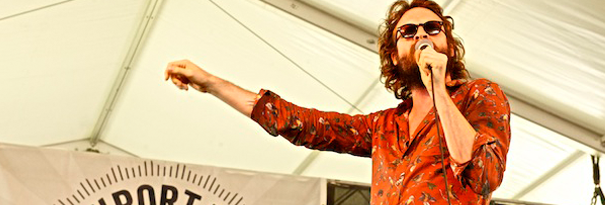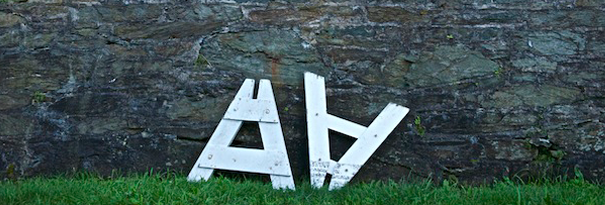As reported on Saturday, the second day of this year’s edition of the iconic Newport Folk Festival, former Fleet Fox-er, J. Tillman, backed by his new crew Father John Misty, was the first among 50 plus artists throughout the weekend to open up a discourse on what the hell “folk” means these days, both to the legacy of the festival and to the state of culture and music in general, chastising the “fedoras” and “Prius” set for not adhering to the “God damn responsibility to say something with [their] damn songs,” pausing in the last verse of his gospel-stomp, biblical-laced “Fun Times in Babylon” to basically hammer home the point that he’s on a mission to go into the belly of the beast, guns a-blazing, joys a-raping before the whole show goes to shit: [LISTEN]

While at the start of the song, he changed its opening lyric from “fun times in Babylon/that’s what I’m counting on,” to “It’s what folk music is based on.”
He said a lot of brash things. Sometimes perplexing. Sometimes perfect. Sometimes contradictory. Sometimes self-deprecating. Consistently hilarious:
- On apologies: “It’s been a little preachy, and antagonistic. But I promise it’s all just smooches and cinnamon buns from here on out.”
- On anger: “People used to get praised by the government for their folk songs.”
- On the state of music: “Human nationalistic imperialism.”
- On the rest of his set: “Let the satanic Norwegian death metal commence!”
- On his own music: “But I’m not a folk artist. I just got invited here because I’m white, I have a beard and there’s some acoustic guitar on my album.”
- On crowd demographics: “So is this a camping thing? Or do you all just go back to your yachts and call it a night?”
Tillman said it himself – he’s not the arbiter of folk. Nor are the festival organizers anymore, really. When asked by NPR what we could expect from Sunday kitchen-sink genre headliner Beck, producer Jay Sweet unabashedly responded he had no idea, “I just buy the groceries. The artist’s make the meal. I just sit back and hope that it tastes good.”
And if Tillman was aiming at anyone in particular for selling out, it was most definitely The Lumineers, who played Sunday as well – clad in fedoras, no Prius’ in sight, though – and not Sweet or the legacy of the festival. Although the NFF did go for-profit for a number of years before returning to its 501©(3) roots in 2011. It’s clear the festival is simply providing a stage for whatever pulse is left in folk to beat. That objective responsibility goes back to the booing of Dylan going electric in 1965.
As one of the poster children of relevant indie-rock, though, Tillman stood on holy ground where Joan Baez made her debut, where Pete Seeger and Woody Guthrie verses are above the law and stay protected by the fortress that is Fort Adams, and more or less asked if folk is dead, let alone still capable of beating a pulse, backing the premonition with a closing new tune called “Bored in the USA,” winking, “I think it’s about something,” before howling the ultimate BOSS-ian fist for the millennial, full of an acerbic dark wit, asking “President Jesus” to save him: [LISTEN]

Of course in a festival setting in 2013, it’s kind of hard to keep that conversation going. But the beauty of the NFF, is that it’s capped at 10,000 people/day, there are only four stages, and community is king. Even surrounded by yachts and sailboats and the mansions of Newport, people with real deal attention spans do make the majority, and do pay most of it to what an artist has to say. And as society and technology blur the conventions of whatever folk means to people, and how it can be delivered, the ways of searching for that pulse and conversation were myriad.
On Friday, as the rain pummeled the Narragansett Bay, weepy string cathartic narratives dominated the afternoon, from The Mountain Goats‘ tales of “divorced couples” and “battle royals” to Phosphorescent‘s “love me foolishly” sing-alongs, Amanda Palmer‘s twisted carnival gender-role reversal chanties, John McCauley‘s reinvention of broken-hearted Duke Ellington standard “Don’t Get Around Much Anymore,” wailing a pining punk-country sentiment that never gets old: [LISTEN]

While Old Crow Medicine Show put faux-hick drawl on every piece of banter they could during their headlining, bluegrass-burning set until people couldn’t take it anymore – “We got banjoes and fiddles just like they did 40 years ago. We got songs just like they did 140 years ago.” – but recovered with a decent cover of Guthrie’s “This Land is Your Land,” just as the sun popped out and turned the sky the most purple shade of aura East of any mountain majesty: [LISTEN]

Woody rightfully showed up again, most notably in Ramblin‘ Jack Elliott‘s weekend defining set – aside from Tillman’s eternal question – the 81-years-young NFF veteran tumbling forth an anthology of stories and wanderlust anecdotes from sailing to one of the most bitter-sweet tales of a dog he taught to drive a car, lacing in the infamous fascist screed “Talking Sailor,” to tie in a metaphor about his penchant for sailing backwards through life: [LISTEN]

The only other performance that came close to Elliott’s was Beck’s, in which Elliott reprised his stage presence on the heels of a sentiment from Beck that a teenage version of the veritable “Loser” used to go see Elliott back in the day, while Elliott came out, and knelt down for some odd reason – hopefully this was a knee or back issue and not some honor gesture – to look up to Beck and duet a cover of Jimmie Rodgers‘ “Waiting for a Train,” while Andrew Bird and members of Black Prairie supported on strings, as they all rallied around the down-and-out tale: [LISTEN]

If we really are to define folk by Tillman’s suggestion that an artist simply must have something to say, though, there wasn’t a false act at all, really. Even funk powerhouse Trombone Shorty, as light as his outfit is on lyrics, wore a sense of what it means to be an American on their sleeves with a riff hurricane rendition of The Guess Who‘s “American Woman,” Troy Andrews freewheeling its anti-war, anti-poverty fists with brass instead of verse.
Likewise, Jim James spiritual new solo record, Regions of Light and Sound of God, played in full as James has been doing all year, touched upon what it means to be a young American with a relationship with the higher-ups, The Lone Bellow swelled a trinity of harmonies over a cover of John Prine‘s ”Angel From Montgomery” that threw the blue collar pursuit into its oppressive spotlight once more, Frank Turner led the UK pursuit with a cockney punk country converse that “there is no God,” Justin Townes Earl honored Hank Williams decision to put the 12-bar blues into country with a lament on the evils roughing it as an artist in modern day Brooklyn and The Avett Brothers made sure to split their weepy-string meditations on “I and Love and You” with a “Head Full of Doubt/Road Full of Promise,” reminding everyone of their existential freedoms: [LISTEN]

And possibly the most shocking moment came when The Lumineers took to a cover of Dylan’s “Subterranean Homesick Blues,” which they’ve done several times before, but to hear lead singer Wesley Shultz tell the tale of obsessing over it as a kid in this setting, with the echoes of Tillman’s “Prius” and “fedoras” shots still ringing from earlier that afternoon, validated the simple lovelorn mega-banjo anthem “Ho Hey” that followed it. Not that “Ho Hey” will become part of the American songbook, nor will it ever eschew the laws that bind us, or ever, ever come close to the genius that is “Subterranean Homesick Blues,” but for some twenty-something looking for the upside in heartache, there’s a revealing of the web that binds all genres in the vision of Shultz learning to express himself from the get go with Dylan.
Or it could be just a bit of crafty image molding to sell more Prius and fedoras. It’s your job to cut through the fat.
But there was a moment back in the closing moments of Beck’s set that equally put the future of folk into perspective, after a couple tunes from his “Song Reader” project and wound around an improvisational rap about a fictional yacht off in the distance with “16 Greek columns on it,” “900 flatscreen TVs” and the proverbial “banjo” in the middle of it all waiting to take him away in which he foretold a reminder of what kind of pedestal the NFF of the 50s is placed upon today, and how society might do the same to the 2010s version in the 2050s, proceeding to turn his digital drum machine’s beat to “11″ and narrating a tale of “Where it’s At:” [LISTEN]

Is folk dead? Not if you know how to listen to the reinvention of it.
Tags: Amanda Palmer, Andrew Bird, Beck, Bob Dylan, Father John Misty, Fleet Foxes, Frank Turner, J. Tillman, Jim James, Jimmie Rodgers, Joan Baez, Justin Townes Earl, Pete Seeger, Phosphorescent, Ramblin' Jack Elliott, The Avett Brothers, The Lone Bellow, The Lumineers, The Mountain Goats, Trombone Shorty, Woody Guthrie


